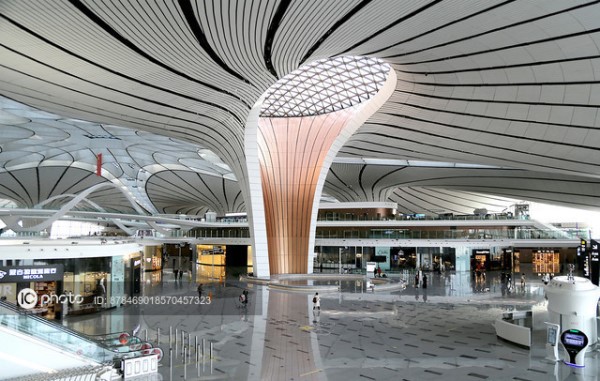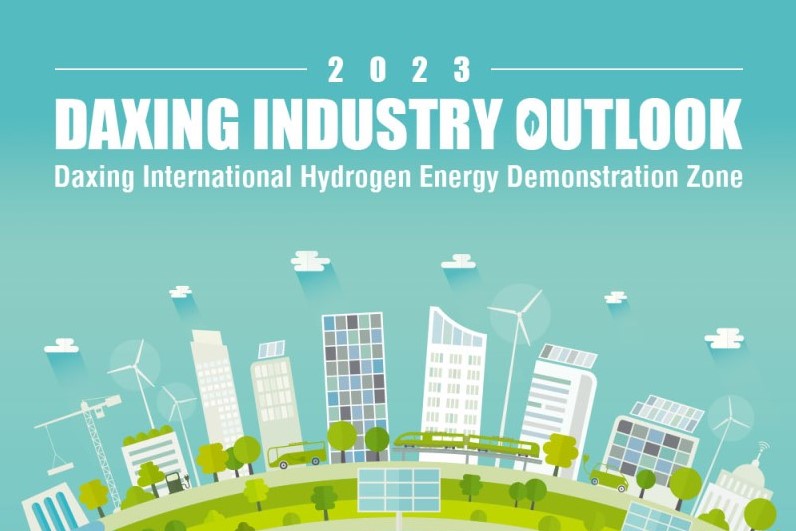Growth of key zone accelerates capital's reform and opening-up
As a national integrated demonstration zone for the service industry, the Beijing Daxing International Airport Economic Zone is ramping up efforts to build a new highland for the capital's reform and opening-up. Officials are also working to develop the zone into a bridgehead for the coordinated development of the Beijing-Tianjin-Hebei region based on a series of favorable policies.
"We uphold the concepts of 'ecology first, development second as well as planning first, construction second' in accordance with high-quality development requirements," said Wang Youguo, head of Beijing's Daxing district.
Wang said officials aim to construct an area that boosts international exchanges, national aviation technology innovation, and a demonstration zone for the coordinated development of the Beijing-Tianjin-Hebei region.
The spatial structure of the airport economic zone includes two districts, three centers, and multiple clusters with ecology as the core and traffic as the context. It will include two functional domains, three ecological sightseeing spots and 15 blocks.
"We will prioritize green travel and public transportation while building a convenient, safe, green and intelligent modern transportation system with a multi-level network such as rail transit, expressways, urban roads, and slow walking trails," Wang said.
"By 2035, we will concentrate on building areas," he added. "The density of the road network will reach nine kilometers per square kilometer. At the same time, various blocks will be connected in series through transportation hubs to form a seamless public transportation system."

High standards and innovation have helped the Beijing Daxing International Airport maintain smooth operation over the past year.[Photo/icphoto.cn]
Officials are planning a large-scale ecological space to create an urban style area with Chinese characteristics, solemnity and elegance, while also building a green city.
The proportion of the residential sector is required to increase, provided the zone meets the environmental protection requirements for noisy areas and that the living space for relocated residents and airport industry employees has been guaranteed.
The zone is expected to achieve a 1-to-2 ratio of occupational to residential land in the general control area by 2035.
About 100 billion yuan ($15.22 billion) will be invested in primary land development, infrastructure and other vital projects during the next three to five years.
A regulation document for the detailed control of the airport economic zone, which clarifies ways to build a more robust service-oriented airport zone, was approved by the Beijing municipal government on Oct 13.
The document, with its top design vision and environmentally friendly standards, has introduced multiple ways to create a high-quality international hub with Chinese characteristics, including convenient transportation systems and public service facilities.
The document also promotes the coordinated development of the Beijing-Tianjin-Hebei region. The planning area of the Beijing part of the airport economic zone is about 50 sq km.
Nearly 15 sq km of land is reserved for national and municipal projects or future technological changes. During a news conference on Dec 3, the airport economic zone's administrative committee announced it has 80 administrative rights and two public service projects. Daxing district's government is also supposed to wield eight municipal powers.
Luo Boming, deputy director of the management committee of the airport economic zone, said authority given to the district government is significant to advancing the construction and development of the airport zone.
"We will shorten the time for handling work and improve the efficiency of administrative services," Luo said. "We'll also work to innovate the system and its mechanisms while optimizing the business environment and promoting industrial agglomeration for a legal guarantee that realizes development of the airport economic zone."
At the same time, the management committee is also trying to improve the comprehensive service level of government affairs and hiring third-party service agencies to provide full-business consulting, assistance and other services, he added.
Wang said the airport zone will focus on reforms and innovation while also making full use of preferential policies. "We will work hard to provide more thoughtful and convenient services for foreign-funded enterprises and professionals coming to work and live in Beijing."

